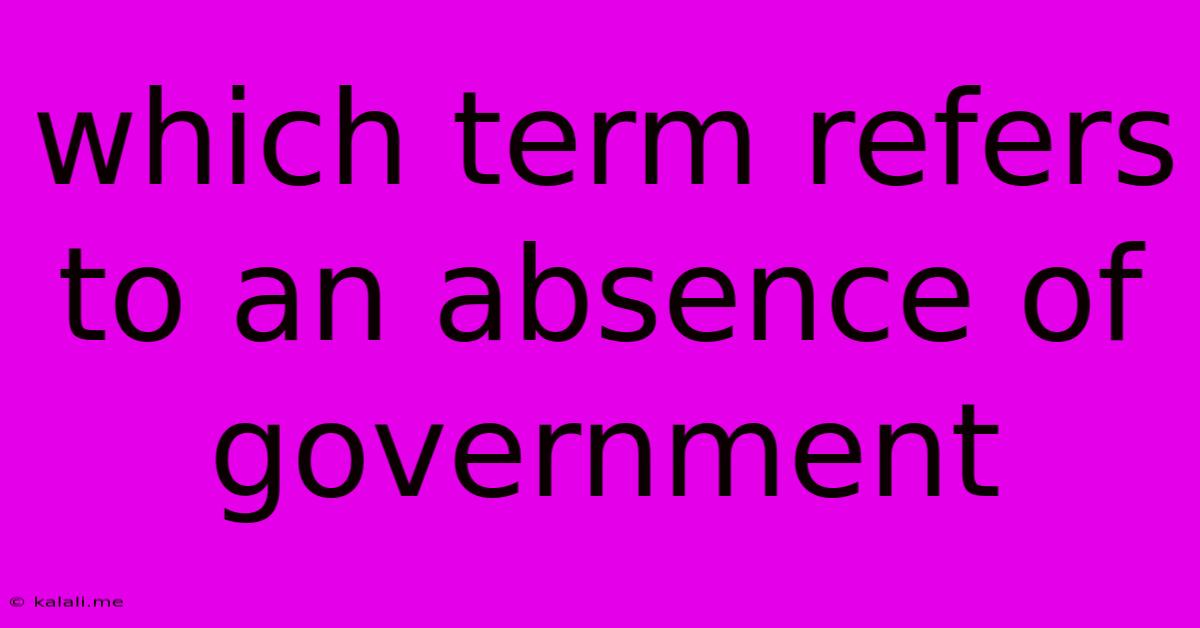Which Term Refers To An Absence Of Government
Kalali
Jun 14, 2025 · 3 min read

Table of Contents
Which Term Refers to an Absence of Government? Understanding Anarchy and Related Concepts
The term that refers to the absence of government is anarchy. This doesn't necessarily mean chaos or lawlessness, although it's often portrayed that way in popular culture. Understanding anarchy requires examining its nuances and distinguishing it from related concepts like libertarianism and stateless societies. This article will delve into the definition of anarchy, explore different interpretations, and clarify its meaning within the broader context of political philosophy.
What is Anarchy?
Anarchy, derived from the Greek words "an" (without) and "archos" (ruler), literally means "without rulers." It's a political philosophy that advocates for the absence of a state or government. Crucially, this doesn't automatically imply a state of societal collapse or violent conflict. Different anarchist schools of thought envision vastly different ways society could function without a centralized governing body.
Some key aspects of anarchism include:
- Rejection of Hierarchy: Anarchists oppose all forms of hierarchical power structures, viewing them as inherently oppressive and unjust. This extends beyond just government to encompass other institutions perceived as controlling or exploitative.
- Emphasis on Individual Liberty: A core tenet of anarchism is the prioritization of individual autonomy and freedom. Anarchists believe individuals should be free to make their own choices and live their lives as they see fit, without undue interference from the state or other powerful entities.
- Self-Governance and Mutual Aid: Many anarchists envision societies based on self-governance and voluntary cooperation. This might involve decentralized decision-making processes, community-based organizations, and mutual aid networks.
- Diverse Approaches: It's vital to understand that anarchism isn't a monolithic ideology. There are many different types of anarchism, including anarcho-communism, anarcho-syndicalism, and mutualism, each with its own unique perspectives on how a stateless society could be organized.
Anarchy vs. Related Concepts:
It's crucial to distinguish anarchy from similar concepts:
- Libertarianism: While both anarchism and libertarianism emphasize individual liberty, they differ significantly in their approach to the state. Libertarians generally advocate for minimal government intervention, while anarchists call for the complete abolition of the state.
- Stateless Societies: Historically, various societies have existed without a centralized state. However, these weren't necessarily anarchist in their ideology. Some were organized through kinship systems, tribal structures, or other forms of decentralized governance. The absence of a state doesn't automatically equate to anarchist principles.
- Chaos and Lawlessness: The common misconception of anarchy as pure chaos is inaccurate. While some anarchists acknowledge the potential for conflict in a stateless society, many believe that a well-organized anarchist society could function peacefully and effectively through voluntary cooperation and mutual respect.
Conclusion:
Anarchy, in its truest sense, refers to the absence of government. However, it's a complex and multifaceted concept with diverse interpretations and approaches. Understanding its nuances requires moving beyond simplistic portrayals of chaos and acknowledging the various philosophical perspectives within the anarchist tradition. The idea of a stateless society, while challenging, continues to provoke debate and inspire alternative visions of social and political organization.
Latest Posts
Latest Posts
-
Requirements For University Of North Georgia
Jun 14, 2025
-
Land With Water On Three Sides
Jun 14, 2025
-
What Sport Has The Most Players On A Team
Jun 14, 2025
-
Atoms That Are The Same Form A
Jun 14, 2025
-
Least Common Multiple Of 14 And 20
Jun 14, 2025
Related Post
Thank you for visiting our website which covers about Which Term Refers To An Absence Of Government . We hope the information provided has been useful to you. Feel free to contact us if you have any questions or need further assistance. See you next time and don't miss to bookmark.